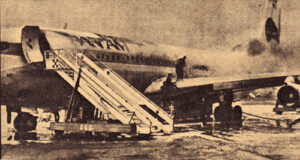TERRORISM – A 1973 forgotten massacre, the Palestinian attack on Rome airport
 It is a forgotten massacre. The attack carried out by a Palestinian terrorist commando at the Fiumicino airport in Rome on December 17, 1973 has fallen into silence, despite standing as the second deadliest act of violence in the history of post-war Italy following the massacre at Bologna railway station in 1980. “90 per cent of Italians do not know about it. We talk about all the massacres, but never of this recurrence. From here my indignation, and I wonder why all that: why we do not commemorate an event that saw the killing of 32 people, among which the financial police officer Antonio Zara”, denounced to the Italian news agency Adnkronos the former police officer Antonio Campanile.
It is a forgotten massacre. The attack carried out by a Palestinian terrorist commando at the Fiumicino airport in Rome on December 17, 1973 has fallen into silence, despite standing as the second deadliest act of violence in the history of post-war Italy following the massacre at Bologna railway station in 1980. “90 per cent of Italians do not know about it. We talk about all the massacres, but never of this recurrence. From here my indignation, and I wonder why all that: why we do not commemorate an event that saw the killing of 32 people, among which the financial police officer Antonio Zara”, denounced to the Italian news agency Adnkronos the former police officer Antonio Campanile.
On that day, Campanile was on duty at the Roman airport. He was manning the passport control booth, when at 12:51, behind his back, hell broke loose. “Suddenly, a burst of gunfire erupted, and people fled. So I went to the office where the marshal, the acting commander that day, was, and I took a long gun with 3-4 magazines and ran to the terrace with other police officers.”
From there, he opened fire on the terrorists, who had meanwhile made their way into the terminal and continued their trail of terror onto the runway. Here they attacked a Pan Am Boeing 707 bound for Tehran. With a white phosphorus-filled incendiary smoke bomb, they set fire to the passengers, mostly Americans. They threw two hand grenades. To escape, they hijacked a Lufthansa plane, which later landed in Kuwait.”
“The brutality of the terrorists caused the death of 32 people, including six Italians: the young custom officer Antonio Zara, killed in an attempt to foil the attack, Raffaele Narciso, Domenico Ippoliti, Giuliano De Angelis with his wife Emma Zanghi, and their daughter Monica,” Italian President Sergio Mattarella recalled. The names of the terrorists are still unknown: they were briefly tried by the Palestine Liberation Organization for carrying out an “unauthorized action,” but shortly after – in 1974 – they were released with the complicity of several governments, both European and Arab. Since then, no one knows what happened to them.
The families of the victims have been left alone with many questions and without justice, denounces Angelo Zara, Antonio’s brother, who was awarded the gold medal for military valor after his death in Fiumicino. “Having emerged from the tunnel of pain, we have asked ourselves questions: why that massacre? Why has it never been talked about over the years? All still unresolved question marks,” Zara stressed to the press agencies. “When these things happen, the judiciary opens a file and carries out investigations,” added the brother of the heroic financial officer. “We have never been informed of the opening of a file or of a possible closure.”
Anna Narciso, daughter of the engineer Raffaele Narciso, who was killed in the attack, was in Fiumicino on the attack anniversary. “For the first time in history,” she explained in a post, “the families of the victims of the massacre” are meeting at terminal 3 “to commemorate, all together, their loved ones.” Fifty years after the attack, their request is that the victims of the Palestinian terrorist attack be included in the list of the National Commemoration held every year on May 9. “Because,” Narciso explains, “there should be no more second-class victims.”
